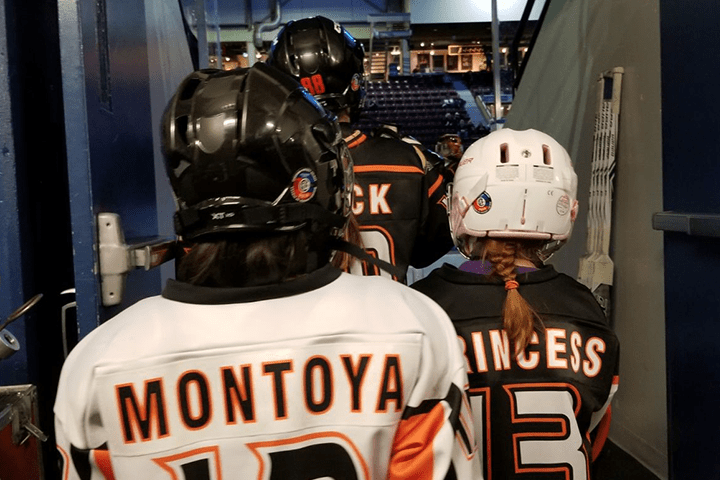The Montoyas have lived in Canada for more than six years. They own property, run small businesses and volunteer within their community.

But if the Canada Border Service Agency (CBSA) has its way, the family of seven, including two small children, will soon be sent back to Colombia — where they say factions of a dangerous paramilitary group want to kill them.
The family is set to be deported on Christmas Eve.
“All the time they told me they will kill me, they will kill me, they will kill me,” said Camilo Montoya, who claims he was kidnapped by members of the Revolutionary Armed Forces of Colombia (FARC) before fleeing to Canada.
“A guy came to me and made me jump in a car and they kept me for two days,” he said. “They just hit me, they insulted me, they just treated me like shit… And in the end they just released me.”
Camilo says he didn’t stop crying for nearly two months after his kidnapping. He says he still has flashbacks, calling the experience a “nightmare.”
“I was afraid all the time. What about if something happened to my son? What about if something happened to my wife? Basically, they took my life into their hands,” Camilo said.
Family says they were beaten, extorted
Camilo, 31, came to Canada in October 2012 with his wife Bettsy, also 31, their one-year-old son Martin, his parents Henry and Dora, as well as his younger sister Luisa, 26, who arrived five months earlier to make an asylum claim.
Since moving to Canada, Camilo and Bettsy had another son, three-year-old Thomas.
The family alleges members of FARC, a group of Marxist rebels that tried to seize control of Colombia, beat them on multiple occasions and threatened to kill them if they didn’t agree to pay thousands of dollars in extortion fees — money the family says they did not have.
WATCH: ‘I was devastated.’ Family in Canada for 6 years set to be deported Christmas Eve
_-PKG_848x480_1396435011563.jpg?w=1040&quality=70&strip=all)
Because FARC was well-known for following through on its threats — and because the family says police in Bogota showed no interest in helping them — the Montoyas chose to flee Colombia and seek refuge in Canada.
Now, more than six years after their claim was first submitted, the Montoyas are set to be deported because a judge at Canada’s Immigration and Refugee Board (IRB) said they were not in need of protection. Conditions in Colombia have improved since they came to Canada, the board said, and FARC is no longer a threat.
But the family says this is untrue, claiming members of FARC continue to threaten them in Colombia, showing up at their former home and questioning neighbours about their location.
They also say that after more than six years living in Canada — at least five years of which were because it took the IRB so long to hear their claim — it’s unfair for them to be sent back to Colombia.
This is especially true for the two young children, the family says, neither of whom have known any country other than Canada as home and one of which is a Canadian citizen.
“I was devastated,” Luisa said, fighting back tears. “To think that it’s just two weeks for us to leave, it was just absolutely devastating. I think that it was the worst news.”
Montoyas waited years for claim to be heard
The Montoyas are what’s known as “legacy” refugee claimants, meaning they filed their application for asylum before December 15, 2012, when Canada implemented a new system for reviewing refugee claims.
But because of a lack of resources and a backlog of more than 32,000 cases at the IRB, their claim was not heard until November 2017.
And because their claim was denied — at least in part because conditions in Colombia had improved during the delay — the family is subject to deportation by the CBSA.
But the family’s lawyer says this process is unfair and unjust, especially since Camilo and his family have outstanding applications to remain in Canada on humanitarian and compassionate grounds that have yet to be heard by the Canadian government.
Luisa also has an outstanding spousal sponsorship application because she married a Canadian five years after moving to Toronto.
“It just doesn’t make sense,” said the family’s lawyer Tyna Vayalilkollattu.
WATCH: Video shows newcomer children experiencing first Canadian snowfall in Toronto

Meanwhile, a spokesperson for public safety minister Ralph Goodale said the government cannot comment on the Montoya’s case specifically.
He did, however, say Canada’s system for determining who gets to stay in the country involves a “robust assessment process and safeguards to ensure that no one is removed to risk or persecution.”
He also said all Canadian citizens — which would include three-year-old Thomas — have a constitutional right to remain in Canada and that it’s up to parents to decide what is in the best interest of their child.
- Posters promoting ‘Steal From Loblaws Day’ are circulating. How did we get here?
- As Canada’s tax deadline nears, what happens if you don’t file your return?
- Video shows Ontario police sharing Trudeau’s location with protester, investigation launched
- Investing tax refunds is low priority for Canadians amid high cost of living: poll
“An application for humanitarian and compassionate consideration does not stay a removal,” said Public Safety spokesperson Scott Bardsley. “By law, once all avenues of appeal are exhausted, CBSA must enforce removal orders as soon as possible.”
Roughly 900 ‘legacy’ claims remain
As of the end of October there were roughly 900 people in Canada still waiting for their “legacy” claims to be heard, according to the IRB.
That compares to nearly 4,000 people that were waiting at the end of 2017 and roughly 5,600 at the end of 2016.
After recognizing that long delays in processing claims create challenges for refugees, including trouble accurately remembering what happened years earlier and problems recovering documents and other evidence that may be used to substantiate a claim, the IRB set up a “Legacy Task Force” in May 2017, with the goal of clearing the backlog of cases within two years.
WATCH: NDP question Liberals over family being deported on Christmas Eve

But legal experts who spoke with Global News argue the government’s efforts to speed up this process, though largely successful, have proven insufficient for families such as the Montoyas who have been caught up in the backlog.
“These deportations are happening and it just doesn’t make any sense,” said Janet Dench, executive director of the Canadian Council for Refugees.
“It’s not the fault of the people that they didn’t get their claims heard soon after they fled when maybe they might have had a good chance of being recognized as refugees,” she said.
Dench says it’s also likely the Montoyas have been swept up in the CBSA’s renewed efforts to “substantially increase” the number of failed refugees it deports each year. She says the goal of removing 10,000 failed asylum seekers in 2018 — a 35 per cent increase over previous years — has placed families like the Montoyas in jeopardy.
“They’re creating an incentive or pressure on officers to deport people whether or not it makes any good sense,” she said.
Sean Rehaag, a professor at Osgoode Hall law school, agrees these cases have not been handled properly.
He says deporting legacy refugees is also often “counter-productive” because most of the costs typically associated with integrating them into Canadian society have already been incurred.
“Deportation, in those circumstances, is cruel,” he said.
The Montoyas, meanwhile, are fighting the CBSA’s decision to send them back to Colombia.
They’ve filed an application with the CBSA to postpone their removal date until their humanitarian applications have been heard. They’re also calling on the Canadian government to intervene, hoping they will not be forced to leave their home on Christmas Eve.
“I made Canada my home,” Luisa said. “I did all I could with the position I was put in.”
WATCH: Christmas wish comes true for family facing deportation

Brian.Hill@globalnews.ca








Comments